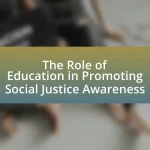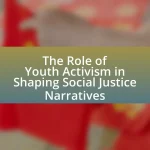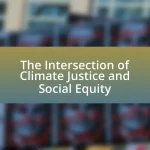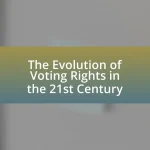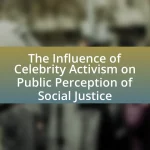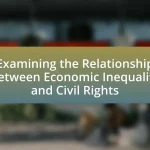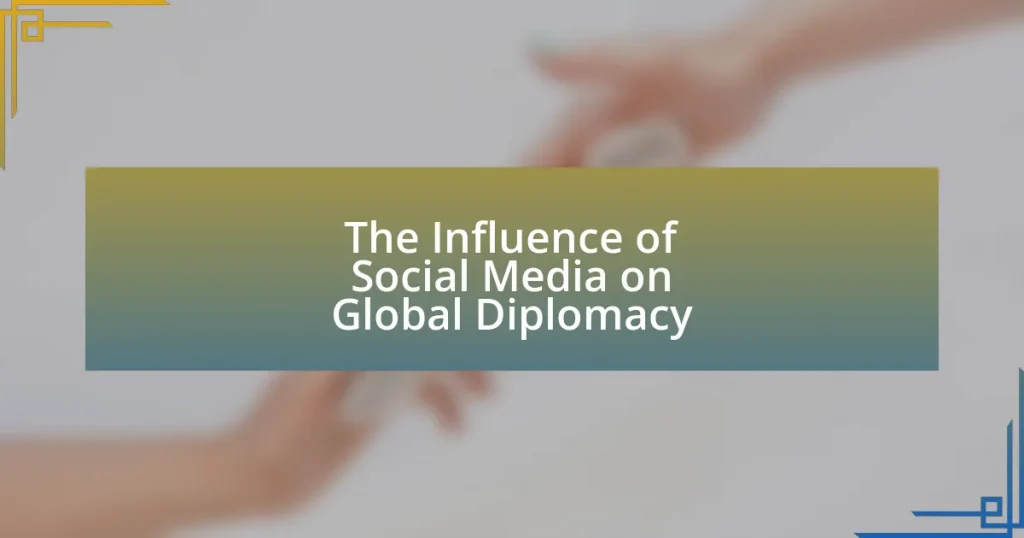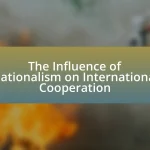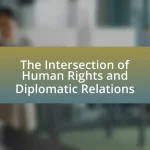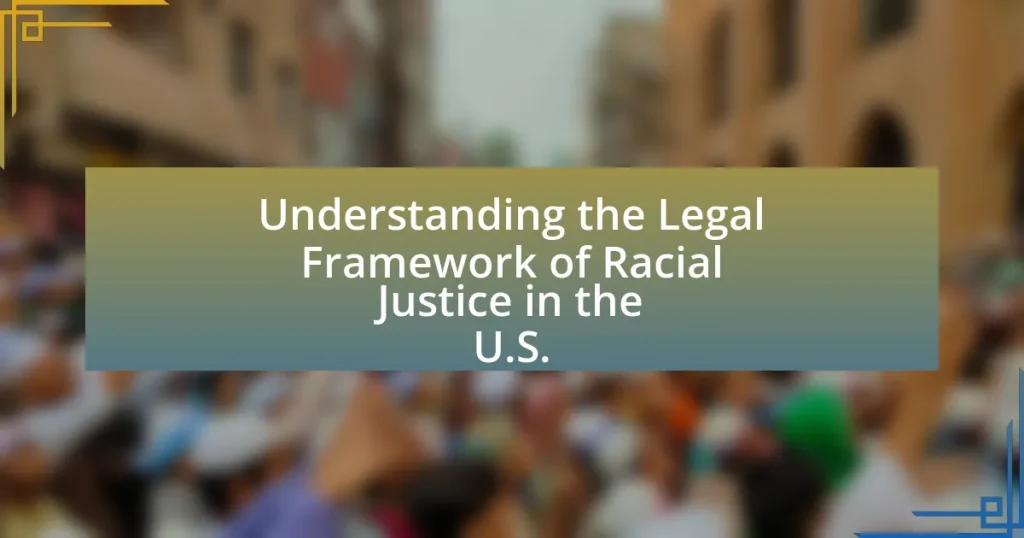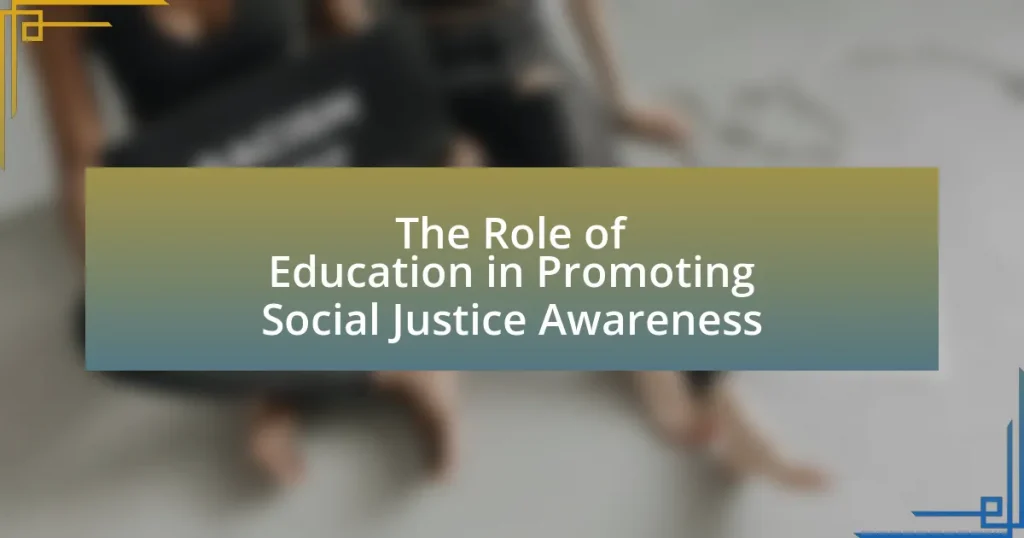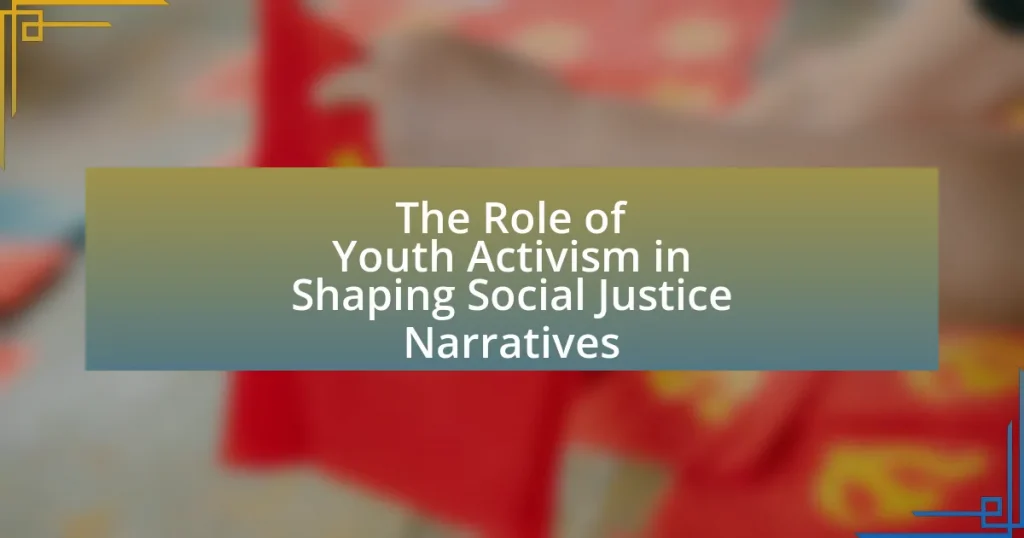The article examines the significant influence of social media on global diplomacy, highlighting its role in facilitating real-time communication and engagement among nations, leaders, and citizens. It discusses how platforms like Twitter, Facebook, and LinkedIn have transformed traditional diplomatic practices by enabling direct communication, fostering transparency, and shaping public opinion. Key topics include the impact of social media on public diplomacy, the challenges posed by misinformation, and the evolving strategies diplomats can employ to effectively engage with audiences online. Additionally, the article explores the implications of social media for bilateral and multilateral relations, as well as future trends in digital diplomacy.
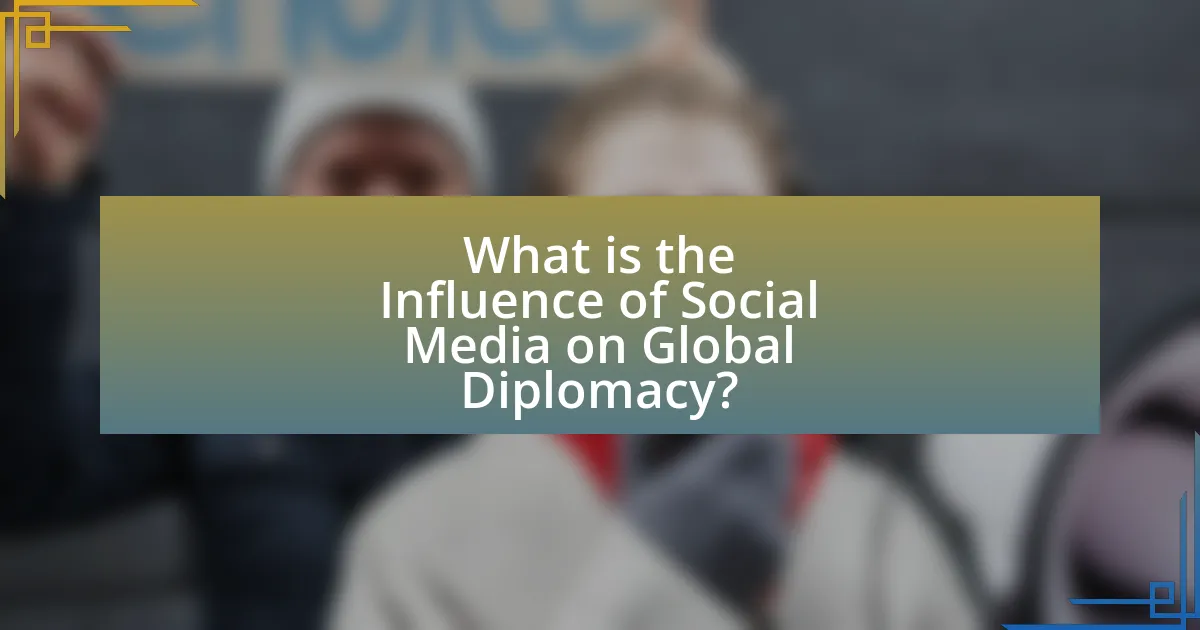
What is the Influence of Social Media on Global Diplomacy?
Social media significantly influences global diplomacy by enabling real-time communication and engagement between nations, leaders, and citizens. This platform allows diplomats to share information quickly, respond to crises, and shape public opinion on international issues. For instance, during the Arab Spring, social media played a crucial role in mobilizing protests and influencing governmental changes, demonstrating its power in shaping political landscapes. Furthermore, social media facilitates direct communication between leaders, as seen in the use of Twitter by various heads of state to convey messages and policies directly to the public, bypassing traditional media channels. This shift has altered the dynamics of diplomatic relations, making them more transparent and immediate, while also posing challenges such as misinformation and the need for rapid response strategies.
How has social media transformed traditional diplomatic practices?
Social media has transformed traditional diplomatic practices by enabling real-time communication and direct engagement between diplomats and the public. This shift allows for immediate dissemination of information, fostering transparency and accountability in diplomatic actions. For instance, the Arab Spring demonstrated how platforms like Twitter and Facebook facilitated grassroots movements, influencing foreign policy decisions and diplomatic responses from various nations. Additionally, social media has created new channels for public diplomacy, where governments can directly communicate their messages to global audiences, bypassing traditional media filters. This evolution has led to a more participatory approach in diplomacy, where public opinion can significantly impact diplomatic negotiations and strategies.
What are the key platforms influencing global diplomacy?
Key platforms influencing global diplomacy include Twitter, Facebook, and LinkedIn. Twitter serves as a real-time communication tool for diplomats and world leaders, enabling them to share updates and engage with the public directly, as evidenced by the use of Twitter by various heads of state during international crises. Facebook allows for broader outreach and engagement with diverse audiences, facilitating discussions and public diplomacy initiatives. LinkedIn, primarily a professional networking site, is increasingly used for diplomatic networking and collaboration among professionals in international relations. These platforms have transformed traditional diplomatic practices by enabling faster communication and greater public involvement in diplomatic discourse.
How do these platforms facilitate communication between nations?
Social media platforms facilitate communication between nations by providing real-time channels for dialogue and information sharing. These platforms enable governments, diplomats, and citizens to engage directly, bypassing traditional media filters. For instance, Twitter has been used by leaders to announce policies and respond to international events instantly, exemplified by the use of hashtags during crises to mobilize support and disseminate information rapidly. Additionally, platforms like Facebook and Instagram allow for cultural exchange and public diplomacy, fostering mutual understanding through shared narratives and experiences. The immediacy and accessibility of these platforms enhance transparency and accountability in international relations, as seen in the Arab Spring, where social media played a crucial role in mobilizing protests and communicating demands for change.
Why is social media important in contemporary diplomacy?
Social media is important in contemporary diplomacy because it facilitates direct communication between governments and citizens, enhancing transparency and engagement. This platform allows diplomats to disseminate information rapidly, respond to public sentiment, and shape narratives in real-time. For instance, during the Arab Spring, social media played a crucial role in mobilizing protests and influencing political change, demonstrating its power in shaping diplomatic outcomes. Additionally, social media enables the monitoring of global public opinion, allowing diplomats to adapt their strategies accordingly, which is essential in an increasingly interconnected world.
What role does public opinion play in diplomatic relations?
Public opinion significantly influences diplomatic relations by shaping government policies and international negotiations. When citizens express their views on foreign affairs, governments often respond to maintain public support, which can lead to changes in diplomatic strategies. For instance, during the Iraq War, widespread public opposition in the United States affected the government’s approach to foreign policy and international alliances. Additionally, social media amplifies public sentiment, allowing for rapid dissemination of opinions that can pressure governments to act in alignment with popular views. This dynamic illustrates how public opinion serves as a critical factor in the formulation and execution of diplomatic relations.
How does social media shape the narrative of international events?
Social media shapes the narrative of international events by enabling real-time communication and information dissemination, which influences public perception and diplomatic responses. Platforms like Twitter and Facebook allow individuals and organizations to share news, opinions, and firsthand accounts, often bypassing traditional media filters. For instance, during the Arab Spring, social media was pivotal in mobilizing protests and spreading awareness globally, demonstrating its power to alter narratives and impact political outcomes. Additionally, studies indicate that social media can amplify specific viewpoints, leading to echo chambers that reinforce biases and shape collective understanding of events, as seen in the coverage of conflicts like the Syrian Civil War.
What challenges does social media present to global diplomacy?
Social media presents significant challenges to global diplomacy by facilitating the rapid spread of misinformation and creating polarized public opinions. The immediacy of social media allows false narratives to gain traction quickly, undermining diplomatic efforts and complicating international relations. For instance, during the 2016 U.S. presidential election, social media platforms were exploited to disseminate misleading information, which influenced public perception and policy discussions. Additionally, social media can amplify extremist views, making it difficult for diplomats to engage in constructive dialogue. The lack of control over content and the potential for viral misinformation create an environment where diplomatic messages can be distorted or misinterpreted, further complicating negotiations and international cooperation.
How can misinformation impact diplomatic efforts?
Misinformation can significantly undermine diplomatic efforts by creating distrust between nations and complicating negotiations. For instance, false narratives can lead to misinterpretations of intentions, resulting in escalated tensions or conflicts, as seen in the 2014 Ukraine crisis where misinformation about military actions fueled international disputes. Additionally, misinformation can hinder the establishment of effective communication channels, as countries may become wary of engaging with each other, fearing manipulation or deceit. This was evident during the COVID-19 pandemic, where misinformation about vaccine efficacy affected international cooperation on public health initiatives. Thus, the spread of misinformation directly impacts the ability of nations to engage in constructive dialogue and reach diplomatic agreements.
What are the risks of diplomatic communication via social media?
The risks of diplomatic communication via social media include misinformation, loss of control over messaging, and potential diplomatic incidents. Misinformation can spread rapidly on social media platforms, leading to misunderstandings or escalations in diplomatic tensions, as seen in various international crises where false information influenced public perception and government responses. Additionally, diplomats may lose control over their messages once shared, as social media allows for rapid sharing and reinterpretation, which can distort the original intent. Furthermore, public statements made on social media can lead to unintended diplomatic incidents, as seen when tweets or posts provoke reactions from other nations, potentially straining relationships.
How does social media influence public diplomacy?
Social media significantly influences public diplomacy by enabling direct communication between governments and foreign publics. This platform allows states to disseminate information rapidly, engage in dialogue, and shape narratives that can enhance their soft power. For instance, during the Arab Spring, social media was pivotal in mobilizing public opinion and influencing political change, demonstrating its capacity to affect diplomatic relations and perceptions. Additionally, studies show that 70% of diplomats believe social media is essential for effective communication in diplomacy, highlighting its growing importance in shaping international relations.
What strategies can diplomats use to effectively engage on social media?
Diplomats can effectively engage on social media by utilizing targeted messaging, active audience interaction, and strategic content sharing. Targeted messaging involves crafting specific communications that resonate with diverse audiences, ensuring that the content aligns with cultural and regional sensitivities. Active audience interaction is crucial; diplomats should respond to comments and questions promptly to foster dialogue and build trust. Strategic content sharing includes using multimedia elements like videos and infographics to enhance engagement, as studies show that visual content increases user interaction rates significantly. For instance, a report by the Pew Research Center indicates that social media posts with images receive 94% more views than those without. By implementing these strategies, diplomats can enhance their outreach and influence in the digital landscape.
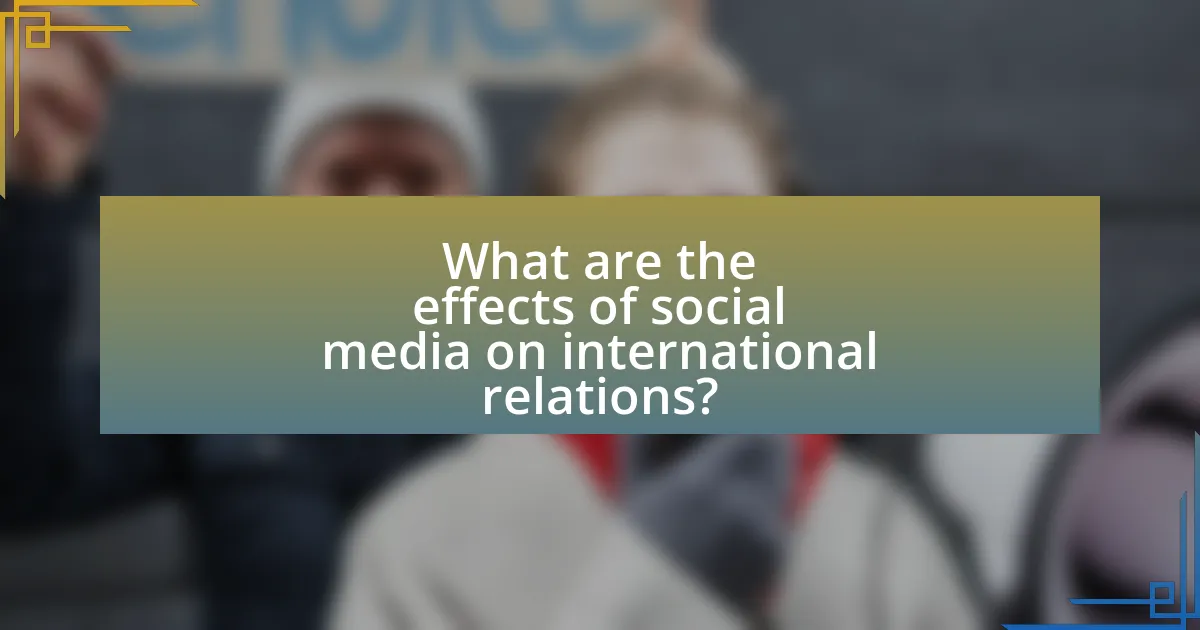
What are the effects of social media on international relations?
Social media significantly impacts international relations by facilitating real-time communication and information dissemination among states, non-state actors, and the public. This immediacy allows for rapid responses to global events, influencing diplomatic strategies and public opinion. For instance, during the Arab Spring, social media platforms like Twitter and Facebook played crucial roles in mobilizing protests and shaping narratives, which in turn affected foreign policy decisions by various governments. Additionally, social media enables states to engage in soft power diplomacy, allowing them to project influence and foster relationships through cultural exchange and public diplomacy initiatives. The rise of misinformation and propaganda on these platforms also poses challenges, as states must navigate the complexities of information warfare and its implications for national security and international stability.
How does social media affect bilateral relations between countries?
Social media significantly affects bilateral relations between countries by facilitating direct communication and public diplomacy. It allows governments to engage with foreign populations, shaping perceptions and fostering dialogue. For instance, during the Arab Spring, social media platforms were instrumental in mobilizing citizens and influencing international responses, demonstrating how online discourse can impact diplomatic relations. Additionally, social media enables the rapid dissemination of information, which can lead to swift reactions from governments, as seen in the case of the U.S.-Iran tensions where tweets from leaders influenced public sentiment and policy discussions.
What examples illustrate the impact of social media on specific diplomatic incidents?
Social media has significantly impacted diplomatic incidents, with notable examples including the Arab Spring and the U.S.-Iran tensions. During the Arab Spring in 2010-2011, platforms like Twitter and Facebook facilitated rapid communication and organization among protesters, leading to the overthrow of regimes in Tunisia, Egypt, and Libya. This use of social media demonstrated its power to mobilize citizens and influence political change, prompting governments to reconsider their approaches to governance and communication.
In the context of U.S.-Iran relations, the 2009 Iranian presidential election saw widespread protests against alleged electoral fraud, which were amplified through social media. The hashtag #IranElection became a rallying point for activists, drawing international attention and support. This incident highlighted how social media can shape global perceptions and diplomatic responses, as the U.S. government expressed support for the protesters, affecting its diplomatic stance towards Iran.
These examples illustrate that social media not only serves as a tool for communication but also plays a crucial role in shaping diplomatic narratives and influencing international relations.
How do countries leverage social media for soft power?
Countries leverage social media for soft power by utilizing platforms to enhance their global image, promote cultural values, and engage with foreign audiences. For instance, nations like South Korea have effectively used social media to spread K-pop and Korean culture, significantly increasing their cultural influence worldwide. This strategy is supported by statistics showing that the global popularity of K-pop has contributed to a rise in tourism and interest in South Korean culture, with a reported increase in international visitors by over 30% in recent years. Additionally, countries often create official accounts to disseminate information, counter misinformation, and foster dialogue, thereby shaping public perception and building diplomatic relationships.
What role does social media play in crisis diplomacy?
Social media plays a crucial role in crisis diplomacy by facilitating real-time communication and information dissemination among governments, organizations, and the public. During crises, platforms like Twitter and Facebook enable diplomats to quickly share updates, respond to misinformation, and engage with global audiences, thereby shaping narratives and influencing public perception. For instance, during the Arab Spring, social media was instrumental in mobilizing protests and communicating government responses, highlighting its impact on diplomatic relations and international responses. The immediacy and reach of social media allow for rapid engagement, which can either mitigate or exacerbate tensions in diplomatic contexts.
How can social media be used to de-escalate tensions?
Social media can be used to de-escalate tensions by facilitating open communication and promoting dialogue among conflicting parties. Platforms like Twitter and Facebook allow individuals and organizations to share perspectives, clarify misunderstandings, and disseminate accurate information quickly. For instance, during the 2011 Arab Spring, social media played a crucial role in mobilizing peaceful protests and fostering discussions that helped reduce violent confrontations. Additionally, organizations such as the United Nations have utilized social media campaigns to promote peace and reconciliation, demonstrating its effectiveness in conflict resolution.
What are the best practices for crisis communication on social media?
The best practices for crisis communication on social media include timely and transparent communication, active monitoring of social media channels, and engaging with the audience to address concerns. Timely communication ensures that information is shared as events unfold, which helps to prevent misinformation. Transparency builds trust, as stakeholders appreciate honesty about the situation. Active monitoring allows organizations to gauge public sentiment and respond quickly to emerging issues. Engaging with the audience fosters a sense of community and reassures them that their concerns are being heard and addressed. These practices are supported by research indicating that organizations that communicate effectively during crises can mitigate reputational damage and maintain public trust.
How do different cultures perceive social media’s role in diplomacy?
Different cultures perceive social media’s role in diplomacy as a tool for engagement, information dissemination, and public opinion shaping, but the effectiveness and acceptance of this role vary significantly. For instance, in Western cultures, social media is often viewed as a platform for transparency and direct communication between governments and citizens, exemplified by the use of Twitter by political leaders to announce policies or respond to crises. In contrast, some Asian cultures may prioritize traditional diplomatic channels and view social media with skepticism, concerned about misinformation and the potential for public backlash. Research by the Pew Research Center indicates that while 69% of Americans believe social media enhances political engagement, only 45% of individuals in countries like Japan share this sentiment, highlighting cultural differences in the perception of social media’s diplomatic utility.
What are the implications of social media for multilateral diplomacy?
Social media significantly impacts multilateral diplomacy by facilitating real-time communication and engagement among nations. This immediacy allows diplomats to respond swiftly to global events, shaping public opinion and influencing negotiations. For instance, during the Arab Spring, social media platforms were instrumental in mobilizing public support and altering diplomatic stances, demonstrating their power in shaping international relations. Furthermore, social media enables non-state actors and civil society to participate in diplomatic dialogues, broadening the scope of influence beyond traditional state actors. This shift can lead to more inclusive and representative diplomatic processes, but it also poses challenges, such as the spread of misinformation and the potential for diplomatic conflicts arising from public discourse.
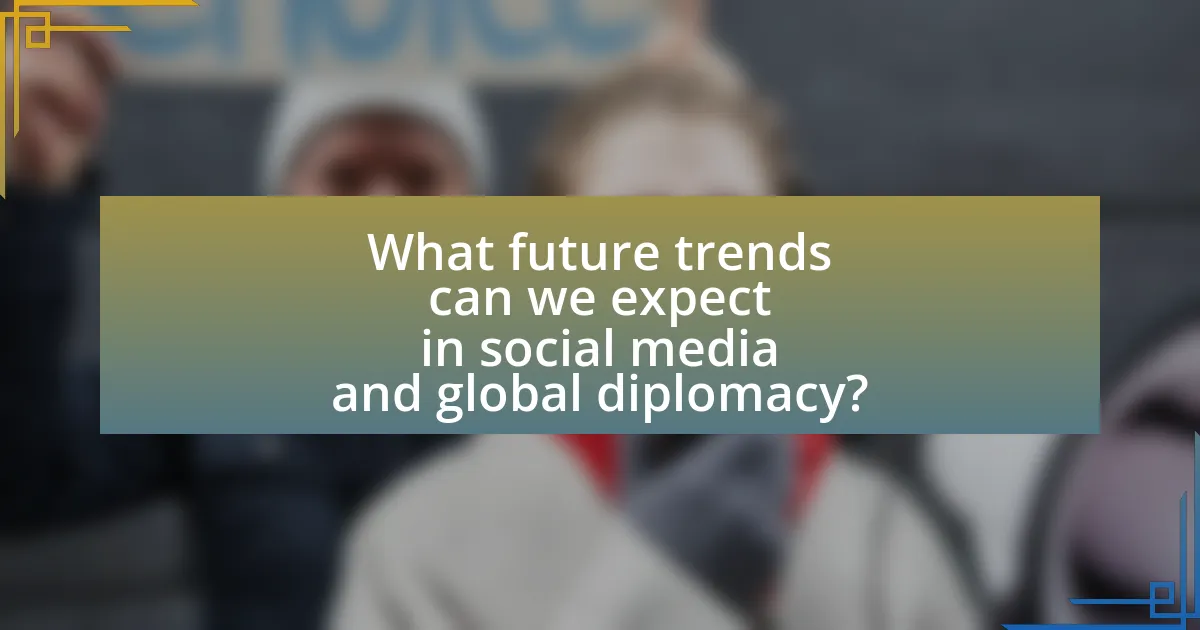
What future trends can we expect in social media and global diplomacy?
Future trends in social media and global diplomacy will likely include increased use of digital platforms for real-time communication and engagement between nations. As governments and diplomats recognize the power of social media to shape public opinion and facilitate dialogue, they will increasingly leverage these platforms for diplomacy, crisis management, and public diplomacy initiatives. For instance, the rise of Twitter and Facebook has already transformed how leaders communicate directly with citizens and other nations, bypassing traditional media channels. Additionally, the integration of artificial intelligence and data analytics will enhance the ability to gauge public sentiment and tailor diplomatic messages accordingly. This trend is supported by the growing number of diplomatic missions establishing social media strategies, as evidenced by the U.S. State Department’s use of platforms to promote foreign policy objectives and engage with global audiences.
How might emerging technologies shape the future of diplomatic engagement?
Emerging technologies will significantly shape the future of diplomatic engagement by enhancing communication, data analysis, and public diplomacy efforts. For instance, social media platforms enable real-time interaction between diplomats and global citizens, fostering transparency and engagement. According to a 2020 study by the Digital Diplomacy Research Group, 70% of diplomats reported using social media to communicate with foreign publics, demonstrating its growing importance in diplomatic strategies. Additionally, advancements in artificial intelligence and big data analytics allow for more informed decision-making by analyzing public sentiment and trends, which can guide diplomatic initiatives. These technologies not only streamline communication but also democratize access to diplomatic discourse, thereby reshaping traditional power dynamics in international relations.
What role will artificial intelligence play in social media diplomacy?
Artificial intelligence will play a crucial role in social media diplomacy by enhancing communication strategies and analyzing public sentiment. AI algorithms can process vast amounts of data from social media platforms, enabling diplomats to gauge public opinion and tailor their messages accordingly. For instance, AI-driven sentiment analysis tools can identify trends and reactions to diplomatic initiatives in real-time, allowing for more responsive and effective engagement. This capability is supported by research from the Pew Research Center, which highlights that 69% of adults in the U.S. use social media, making it a vital channel for diplomatic outreach. Additionally, AI can automate content creation and dissemination, ensuring that diplomatic messages reach targeted audiences efficiently.
How can data analytics enhance diplomatic strategies on social media?
Data analytics can enhance diplomatic strategies on social media by providing insights into public sentiment, engagement patterns, and the effectiveness of communication efforts. By analyzing large datasets from social media platforms, diplomats can identify key issues that resonate with target audiences, allowing for tailored messaging that addresses specific concerns. For instance, a study by the Pew Research Center found that 69% of adults in the U.S. use social media, highlighting its significance as a communication tool. Furthermore, data analytics can track the reach and impact of diplomatic messages, enabling real-time adjustments to strategies based on audience reactions. This data-driven approach allows for more informed decision-making and fosters stronger relationships with global audiences.
What skills will diplomats need to navigate social media effectively?
Diplomats will need strong communication skills, digital literacy, and cultural awareness to navigate social media effectively. Effective communication skills enable diplomats to convey messages clearly and engage with diverse audiences. Digital literacy is essential for understanding various platforms, tools, and analytics to assess the impact of their communications. Cultural awareness allows diplomats to tailor their messages appropriately, considering the cultural contexts of their audience. These skills are crucial as social media can amplify diplomatic messages and influence public opinion rapidly, making it imperative for diplomats to engage thoughtfully and strategically.
How can training programs be developed for diplomats in social media usage?
Training programs for diplomats in social media usage can be developed by integrating practical workshops, theoretical frameworks, and real-world case studies. These programs should focus on enhancing digital communication skills, understanding platform-specific etiquette, and analyzing the impact of social media on public perception and international relations. For instance, the U.S. State Department has implemented social media training that includes crisis communication strategies and engagement techniques, demonstrating the effectiveness of structured training in improving diplomats’ online presence and responsiveness.
What are the essential digital literacy skills for modern diplomats?
The essential digital literacy skills for modern diplomats include proficiency in social media management, data analysis, cybersecurity awareness, and digital communication. Proficiency in social media management enables diplomats to effectively engage with global audiences, as platforms like Twitter and Facebook are crucial for real-time communication and public diplomacy. Data analysis skills allow diplomats to interpret large volumes of information, facilitating informed decision-making and strategy development. Cybersecurity awareness is vital to protect sensitive information and maintain the integrity of diplomatic communications in an increasingly digital landscape. Lastly, strong digital communication skills are necessary for crafting clear and impactful messages across various digital platforms, ensuring that diplomatic objectives are met in a fast-paced environment.
What practical tips can diplomats follow for effective social media engagement?
Diplomats can enhance their social media engagement by focusing on authenticity, audience understanding, and strategic content sharing. Authenticity builds trust; for instance, sharing personal insights or experiences can humanize diplomatic efforts. Understanding the audience involves analyzing demographics and interests to tailor messages effectively, as seen in successful campaigns that resonate with specific groups. Strategic content sharing includes using visuals and storytelling to convey complex issues simply, which has been shown to increase engagement rates significantly. For example, a study by the Pew Research Center indicates that posts with images receive 94% more views than text-only posts.

